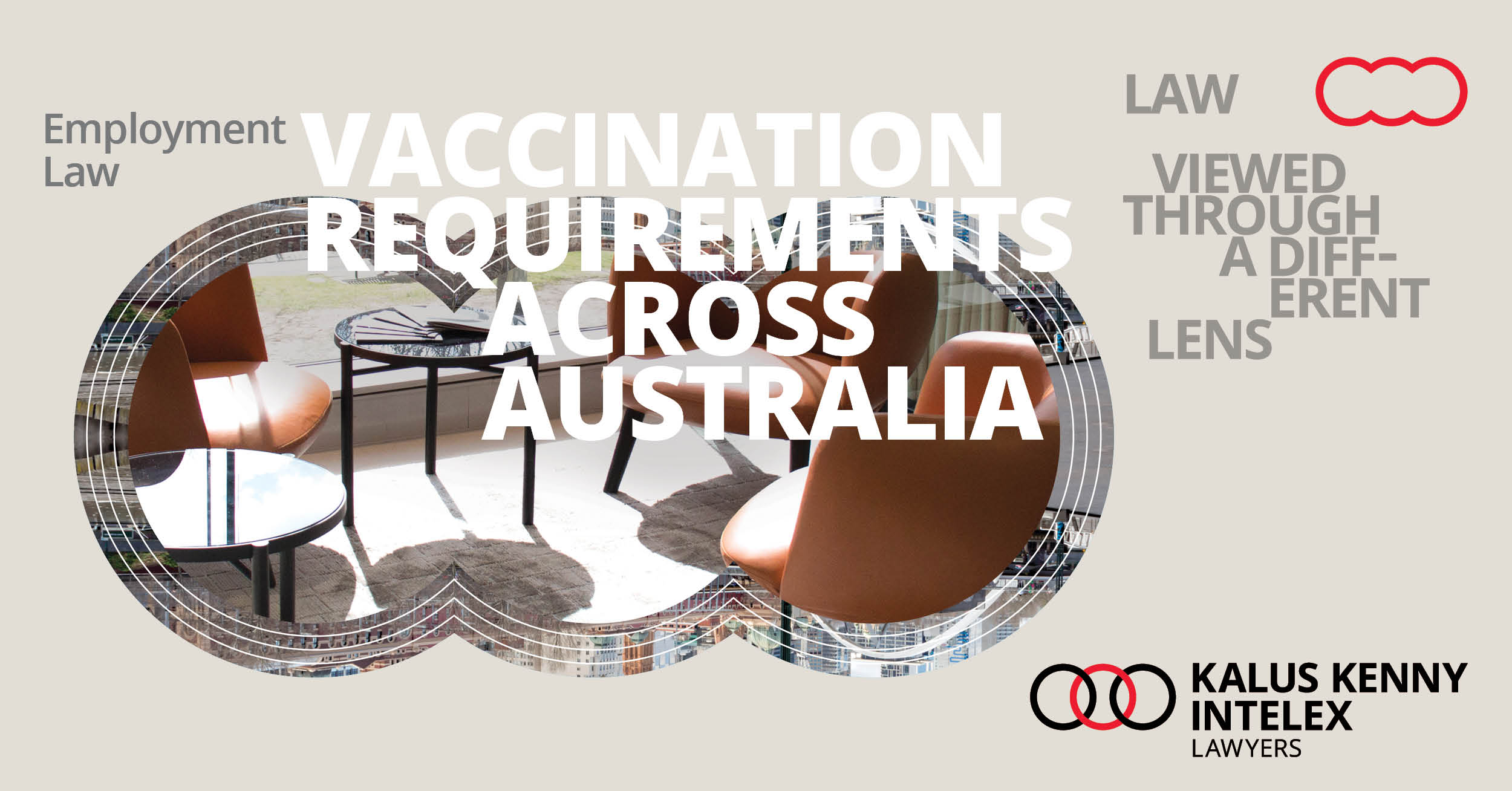Australia has a high uptake of vaccination to COVID-19, partly due to enforceable public health orders at State level which require classes of workers to be vaccinated if they are to work outside of their home.
As at 9 February 2022, the position is summarised below.
Commonwealth
The Federal Government has not mandated vaccination but has endorsed state mandates for vaccination of workers in aged care settings.
State mandates
Broadly speaking, the states have issued directions requiring employers to:
- notify employees of the vaccination requirements;
- ensure employees do not enter or remain at the work premises if they are not sufficiently vaccinated unless they hold a medical exemption; and
- maintain a written record of the employee’s vaccination status or exemption.
Employees must provide evidence of their vaccination status to their employer. Individuals may access a vaccination record upon receiving a second dose of a vaccine approved for use in Australia.
Exemptions apply to the vaccination requirements, for example, where a person cannot be vaccinated on medical grounds.
Australian Capital Territory (ACT)
The ACT has issued Directions for workers in high-risk and critical employment sectors including residential aged care, school and early childhood facilities, hospital, hospice, health services and patient transport workers, disability support workers and community support. [1]Workers in these industries must have received 2 doses of a COVID-19 vaccine.
ACT has not issued any other directions for other groups of workers.
New South Wales (NSW)
In NSW, Orders require employers to collect information in relation to the vaccination status of employees in health care[2], aged care and education.[3] In other industries, employers may only collect evidence of vaccination status in limited circumstances.
The requirements for health care workers vary depending on the nature of their role. Those who do not come into physical contact with members of the community and can provide that service from a location where there are no patients or others accessing the health care may be exempt from vaccination.
Education and care workers and workers in residential aged care, in-home and community care services, or disability services, must be vaccinated with 2 doses of an approved COVID-19 vaccine.
Northern Territory (NT)
The NT has issued a number of directions mandating vaccination. Workers over 18 years of age must receive a third dose of a COVID-19 vaccine by 11 March 2022 to allow them to continue working in hospitals and healthcare, residential aged care, disability residential facilities, hostels and shelters.
All other workers in the NT are must receive a third dose of a COVID-19 vaccine by 22 April 2022 if they come into contact with vulnerable people, the workplace poses a high risk of infection or workers perform work that is necessary for the operation of essential infrastructure or logistics in the NT.
Queensland
Directions issued in Queensland[4] mandate vaccination for workers in healthcare and in high-risk settings. Workers in a healthcare setting, including aged care facilities and disability service providers, cannot enter, work in or provide services to these settings unless they have had two vaccination doses.
High-risk settings include all kindergarten, childcare, and primary and secondary education centres, prisons, youth detention centres and community correction centres, airports and airport precincts.
Exceptions apply to workers who cannot be vaccinated due to a medical reason, provided they pose no risk to other staff and patients or in the event of a Critical Workforce Shortage (as defined in the Order).
Employers may make a lawful direction requiring an employee to be vaccinated, where the employer has determined that it is a requirement of the employee’s role.
South Australia
In South Australia, several high risk industries are subject to mandatory vaccination health directions.
For industries not covered by mandatory vaccination directions, the vaccine should be considered as a control measure to minimise COVID-19 exposure risks in the workplace.[5] Where a risk is identified, an employer must eliminate, or alternatively reduce, the risk so far as reasonably practicable.
Tasmania
Orders in Tasmania mandate vaccinations for workers in a number of settings considered to be ‘high-risk’. The Orders apply to workers in aged care, quarantine, medical and health care settings, high intensity disability support, hospitality and early childhood facilities[6].
Victoria
Orders in Victoria[7] require workers in a range of industries to be vaccinated and require employers (or operators of aged care facilities, construction sites, healthcare and education facilities[8]) to collect and record information about workers’ vaccination status including the date they became fully vaccinated.
Workers in industries to which Orders apply may not work outside their home unless they are vaccinated with two doses of a vaccine, or for workers in aged care, education, construction or healthcare, 2 doses and a booster vaccination.
Employers in Victoria who fail to comply with the public health orders may face penalties.
Workers in the industries to which mandatory vaccination apply must disclose their COVID-19 vaccination status to their employer. Employees who refuse to do so are considered unvaccinated.
Western Australia
In Western Australia, vaccination is mandated for a majority of industries, including building and construction, critical infrastructure, health care, residential care workers, education workers and remote aboriginal community workers.
Unlike most other state jurisdictions, the Orders are industry specific rather than centralised. Consequently, different commencement dates and exemption criteria apply.[9]
For industries not covered by mandatory vaccination directions, vaccination is considered as a control measure to minimise COVID-19 exposure risks in the workplace.[10] Other recommended control measures include physical isolation, workplace bubbles minimising contact, physical distancing, wearing face masks, encouraging good hygiene and ensuring unwell employees do not attend the workplace.[11]
Employer mandates in the absence of government mandates
Under the Fair Work Act 2009, employees must comply with a lawful and reasonable direction of their employer. Whether an employers’ direction for an employee to be vaccinated is reasonable, will depend on the circumstances of their employment.
Although the health directions in the various states are broad, they do not apply to all industries. Employers are subject to health and safety legislation to ensure that the provide a safe workplace. Employers who are not covered by the health directions who wish to implement a direction for employees to be vaccinated must:
- engage in a consultation process with employees before implementing a vaccination mandate;
- consider whether there are other safe and effective alternatives;
- consider specific objections or employees.
Provided that the consultation process has been properly undertaken, in circumstances where employees are required to closely interact with other employees or with the public, it is likely that an employer direction for employees to be vaccinated will be considered to be reasonable.
Discrimination
Employers must continue to be aware of their obligations under various discrimination legislation. Employees may have medical reasons or other reasons for not being vaccinated. Employers must consider objections by employees to be vaccinated on a case by case basis to and must be mindful of their obligations to avoid discriminating against an employee, both directly and indirectly.
Recent cases
Numerous Courts and Tribunals have upheld vaccine mandates[12]. Recently, the Fair Work Commission has upheld the dismissal of unvaccinated employees where government COVID-19 vaccination mandates apply[13]. Employers must maintain procedural fairness and inform the employee of the possibility of dismissal if the employee refuses to be vaccinated and provide an opportunity to respond.
Summary of Legislation and Directions
| State or Territory | Relevant Legislation | Orders or Directions (non exhaustive) |
| Australian Capital Territory | Public Health Act 1997 | |
| New South Wales | s.7 of the Public Health Act 2010 (NSW) | Public Health (COVID-19 Vaccination of Health Care Workers) Order (No 3) |
| Northern Territory | s. 52 of the Public and Environmental Health Act 2011 | |
| Queensland | 326B of the Public Health Act 2005 (QLD) | Workers in a healthcare setting (COVID-19) Vaccination Requirements) Direction (No.3) |
| South Australia | ss 14 and 23 of the Emergency Management Act 2004 (SA) | See list of directions at https://www.covid-19.sa.gov.au/emergency-declarations
|
| Tasmania | s.16 of the Public Health Act 1997 (Tas) | Public Health Act 1997 Direction under section 16 (Vaccination requirements in relation to early Childhood Facilities No. 1) |
| Victoria | s.165AI of the Public Health and Wellbeing Act 2008 (Vic) | COVID-19 Mandatory Vaccination (Workers) Direction (No. 8) |
| Western Australia | 157(1)(e), 157(1)(K), 180 and 190(1)(p) of the Public Health Act 2016 (WA) | See list of directions on the Western Australia Mandatory Vaccination webpage: https://www.wa.gov.au/government/document-collections/covid-19-coronavirus-mandatory-vaccination |
[1] Public Health (Health Care and Support Workers COVID-19 Vaccination) Emergency Direction 2021; Public Health (Aged Care Workers COVID-19 Vaccination) Emergency Direction 2021 (No 2); Public Health (ACT School or Early Childhood Education and Care Workers COVID-19 Vaccination) Emergency Direction 2021 (No 2); Public Health (Disability and Other Care Workers COVID-19 Vaccination) Emergency Direction 2021
[2] Public Health (COVID-19 Vaccination of Health Care Workers) Order (No 3)
[3] Public Health (COVID-19) Vaccination of Education and Care Workers) (Order) (No 2) 2021 https://justiceconnect.org.au/resources/nsw-covid-19-mandatory-vaccination-directions/
[4] Workers in a healthcare setting (COVID-19) Vaccination Requirements) Direction (No.3)
[5] https://www.safework.sa.gov.au/industry/health-and-community-care/infectious-diseases/coronavirus-covid-19/covid-19-vaccinations
[6] Public Health Act 1997 Direction under section 16 (Vaccination requirements in relation to early Childhood Facilities No. 1)
[7] COVID-19 Mandatory Vaccination (Workers) Direction (No. 8)
[8] Guidance for the Pandemic COVID-19 Mandatory Vaccination (Specified Facilities) Order 2022 (No.2)
[9] A complete list can be found on the Western Australia Mandatory Vaccination webpage
[10] https://www.safework.sa.gov.au/industry/health-and-community-care/infectious-diseases/coronavirus-covid-19/covid-19-vaccinations
[11] https://www.safework.sa.gov.au/industry/health-and-community-care/infectious-diseases/coronavirus-covid-19/covid-19-vaccinations
[12] See for example Hassam v Hazzard; Henry v Hazzard [2021] NSWCA 299
[13] Aucamp v Association for Christian Senior Citizens Homes Inc. [2021] FWC 6669





